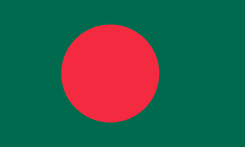

A software engineer by profession, Didarul had worked in Europe and Australia before relocating to Dhaka and starting his software firm in the end off 2008. In 2013, he became active in a socio-political movement in Dhaka and co-founded a social organization with a few friends called “Parivartan Chai” (which translates to “we want change” in Bangla) that focused mainly on cleanliness campaigns, especially targeting the youth. His political activism grew with his joining a political think tank called ‘Rashtrochinta’ that served as a platform for intellectual discourse and policy advocacy. When the COVID-19 pandemic hit in 2019, Rashtrochinta shifted its focus to pandemic response efforts and their Pandemic Response Monitoring Team (Durjog Shahyata Monitoring Committee) composed of social leaders, lawyers, writers, and reporters monitored government efforts to support those affected by the pandemic. They published a critical report, which revealed that the poorest districts of the country were receiving insufficient aid while the weathier districts received excess aid. Didadrul played a key role in circulating this report on social media, especially on Facebook on 04 May 2020.
He received a threatening anonymous message on Facebook Messenger the next day to cease disseminating the report and his advocacy efforts. That evening he was ambushed in his home-office by officers dressed in civilian attire who claimed to be from the Rapid Action Battalion, an elite paramilitary force. His electronic equipment including his mobile phone were seized. What added to Didarul’s concern was seeing 15 people and two minibuses outside his building. He was taken away by them to what he assumed was a RAB facility. He was blindfolded and interrogated for seven hours, spanning three rounds, about his life history and his work and about a cartoon that highlighted corruption of a high-ranking official associated with a prominent bank known for his connections with top government officials. He was third accused in a case whose first accused was his friend Mushtaq Ahmed (who later died in jail) and the second accused was the cartoonist called Kishore. Only Ahmed and Kishore were directly linked with the cartoon but the government authorities expanded the case to include other critics of the government including journalist Tasneem Khalil of Netra News, activist Shahidul Alam, and Dhaka Stock Exchange Director Minhaz Mannan Emon. Didarul was charged under the draconian Digital Security Act (DSA) 2018, an act that he had opposed. He was charged under the DSA for spreading false information and engaging in “anti-national”, “anti-state”, and “anti-government” conspiracy and activities. Didarul kept reiterating that he was doing research and spreading evidence-based work conducted by a political think tank but he realised that his arrest was linked to such works that exposed government inefficiency and corruption. During COVID-19, remand had been suspended and therefore, civic actors like Didarul were simply arrested and thrown in jail without further proceedings. He spent five months in jail. After multiple bail rejections of bail from lower courts, he finally secured bail from the High Court.
At the time of his imprisonment, his political activism had been recent and ongoing. He had become aware that his work could lead to imprisonment, abduction, and even death. Therefore, his first pushback effort was maintaining his calm at the time of his arrest and during interrogation, being truthful about the information he provided, and being armed with facts. He tried to get as much information as possible from his captors. His second pushback was in continuing his civic work in the jail by working on Corona-related awareness and response for fellow detainees and keeping himself mentally engaged in constructive work and trying to fight the feeling of isolation, out of touch with the outside world and the mental trauma of being in jail with infrequent calls with family. His team members provided legal assistance, publicised his case, and several national and international organisations reached out to provide support and financial assistance. After he was released, Didarul continued with his research and advocacy. He is part of Rashtra Sanskar Andolan, a political party, which was launched in 2021. He is part of civic society pushback to make the government more transparent and prevent draconian laws and mechanisms from exacerbating inequality and rights abuse in Bangladesh. After coming out of jail, he has emphasised highlighting illegality of actions taken under laws like the DSA, maintaining confidence during trial and interrogation, and building networks who would publicise such arrests and provide legal aid as all these increase the likelihood of the targeted civic actor returning safely from jail.